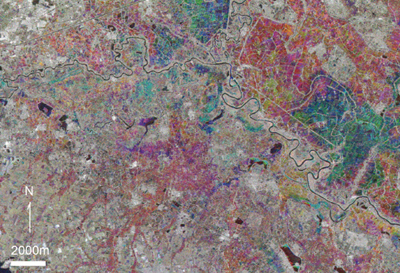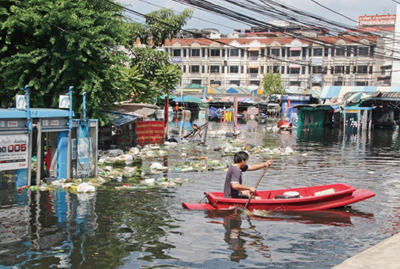Project Leader:NAGANO, Takanori (Graduate School of Agriculture Science, Kobe University)
Collaborators: FUJIHARA, Yoichi (Department of Environmental Science, Ishikawa Prefectural University)
KOZAN, Osamu(Center for Southeast Asian Studies, Kyoto University)
WATANABE, Kazuo (Center for Southeast Asian Studies, Kyoto University)
HOSHIKAWA, Keisuke (Center of Integrated Area Studies, Kyoto University)
Term:2011-2012
Outline of Research:
This research will link local weather conditions and global atmospheric circulation to damage which occurred at village community scale (especially in regards to agriculture) in years where extreme weather occurred in the last 50 years in Southeast Asia. This study will be carried out through the following three steps:
(1) Data about agricultural damage caused by extreme weather will be obtained from field survey records and historical official documents.
(2) An analysis of the relation between observed precipitation data and results of (1).
(3) The relation between spatial/time-series distribution of precipitation and atmospheric circulation will be analyzed using re-analysis climate datasets.

Color composite of three SAR images observed in July, August and September 2007. Hue of each pixel is derived from pattern of seasonal soil moisture change. For example, blue areas were inundated during July to September. This figure shows a spatial distribution of vulnerability to floods and droughts.
Description:

Flood situation in northern suburb of Bangkok (October, 2011). Land use, human activities, and hydraulic systems in Chaophraya River delta have been drastically changing for the last five decades.
The purpose of this research is to construct data to project and mitigate the impact of climate change caused by global warming on agricultural activities and production.
Though local effects of global warming such as changes in precipitation amount have been already projected by various researchers and organizations, the consequences of such extreme weather vary depending of the socio-economic situations of communities and the level of infrastructure, as clearly seen in the flood disaster in Thailand in 2011. This research is expected to provide valuable information to project damages under present and future social conditions as records of field surveys and historical official documents often contain information about the background of disasters as well as the situation of damage caused.
This research attempts to develop a methodology to utilize reanalysis climate data in area studies. Re-analysis climate datasets have been mostly used in climatology, meteorology and hydrology.They can be highly useful for area studies as re-analysis data can provide information about quasiperiodic climate patterns such as El Niño-Southern Oscillation (ENSO) which greatly affected livelihood of local society in the Southeast Asia.
